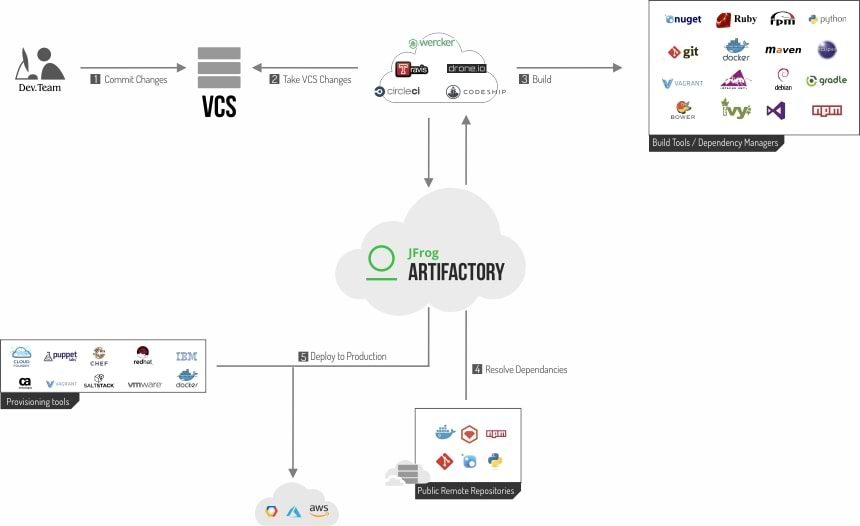ソフトウェアを高速にデプロイするには(クラウド環境編)
これからはクラウド上で開発することが効果的です。それはクラウドで自動化することにより、競争や絶えず変化する市場の要求に対応できる軽快なスピードが手に入るからです。Cloud DevOpsツールは、より高い柔軟性とスピーディーなデプロイ、ITコストや前払いコストの削減をサブスクリプション価格で提供します。
クラウドベースの製品は、資本やリソースがあまりない多くのスタートアップ企業にとってコストパフォーマンスの高いソリューションです。またエンタープライズ企業にとっては、クラウドを導入することにより保守コストや時間管理、サーバーの収容スペース削減などに効果を発揮します。
Cloud CI/CDパイプラインを構築して、バージョン管理やCI/CDサーバーを確認します。ビルドツールや依存関係マネージャ、リモートパブリックリポジトリやデプロイメントツール、クラウドプロバイダを選択します。ひたすらチェックが続き、ようやく自前でメンテナンスしなければいけないサーバーがなくなり、あとは必要に応じてサービスを拡張したりツールやプロバイダーを変更すればいいようになりました。一見するとこれですべてが設定済みのように見えます。
でも実はまだ設定しなければならないことがあります。すべてのビルド成果物と開発チームが作業するパッケージの依存関係を効率的に管理するにはどうすればいいのでしょうか。Cloud CI/CDパイプラインには、バイナリリポジトリマネージャがとても重要です。
クラウド版JFrog Artifactoryの紹介
Artifactoryは、非常にスケーラブルで万能なリポジトリマネージャです。すべての成果物を1か所にまとめて保管し、バイナリと依存関係を最初から最後まで管理し、コーディングからリリースまでの時間を短縮するために不可欠なツールです。
クラウド版JFrog Artifactoryのメリット
ArtifactoryをクラウドCI/CDパイプラインに採用しなければいけない理由は以下のとおりです。
-
- すべての主要な開発技術をサポート
今日のソフトウェア環境では、開発者は複数の技術を使用しています。Artifactoryは、Maven、npm、Python、NuGet、Gradle、Helmなど現在一般的に使用されているほぼすべての主要なパッケージ形式(現在は20以上に増加しています)をサポートする万能なソリューションです。コンテナアプリケーションをKubernetesクラスタにデプロイするときには、DockerレジストリとKubernetesレジストリどちらも使用できます。その他の技術を使用する場合でも、Artifactoryはバイナリを管理できます。
- ほぼすべてのCI/CDサーバーをサポート
Artifactoryはすべての主要なCI/CDサーバーですぐに使える統合環境を提供します。ビルドを実行すると、CI/CDサーバーは成果物をプルしてArtifactoryからの依存関係を解決してから、それらのビルドをArtifactoryに戻してデプロイします。ビルドプロセス中に収集された膨大なメタデータもアップロードされ、ビルドを完全にトレース可能にします。ビルドからデプロイまで成果物を自動でトラッキング可能なソリューションを提供します。 - 比類のない安定性を提供
アクティブクラスター化された高可用性のシステム構成にインストールすると、Artifactoryは最大99.999%の可用性を達成します。高い負荷がかかった状態でもまったくダウンすることなく成果物へのアクセスを提供します。 - 成果物のリモート時に一貫した信頼できるアクセスを提供
ビルドに必要な依存関係や、ホストするリモート公開リポジトリは常に使用可能であるとは限りません。時にはリモートのパブリックリソースが落ちたり、依存関係が解消されたり、ネットワークが不安定になることもあります。これらが原因でビルドが中断される可能性があります。ビルドに必要な成果物がダウンロードされるとArtifactoryはローカルにキャッシュし、再ダウンロードを不要にして、リモート公開リポジトリとネットワークへの依存関係を維持します。 - 無制限のファイルストレージスケーラビリティを提供
クラウドストレージプロバイダ(S3、GCSまたはAzure)を使用するため、あらゆる規模のニーズに対応してストレージをスケールします。ファイルストレージデバイスのインストールや保守の必要はありません。
JFrog Artifactory Cloudは、毎月のサブスクリプション料金が低い従量課金制のモデルで活用できます。私たちはインフラストラクチャの管理と保守など、すべての重い作業を行います。ユーザはクラウドプロバイダを選ぶだけです。Amazon Web ServicesやMicrosoft Azure、Google Cloud Platformなどを自由に選択でき、コロケーションをサポートし、無料のアップデートでリージョンを選択できます。
これらの作業を始めるのがどれほど簡単かを、ぜひ実際に試して確認ください。









